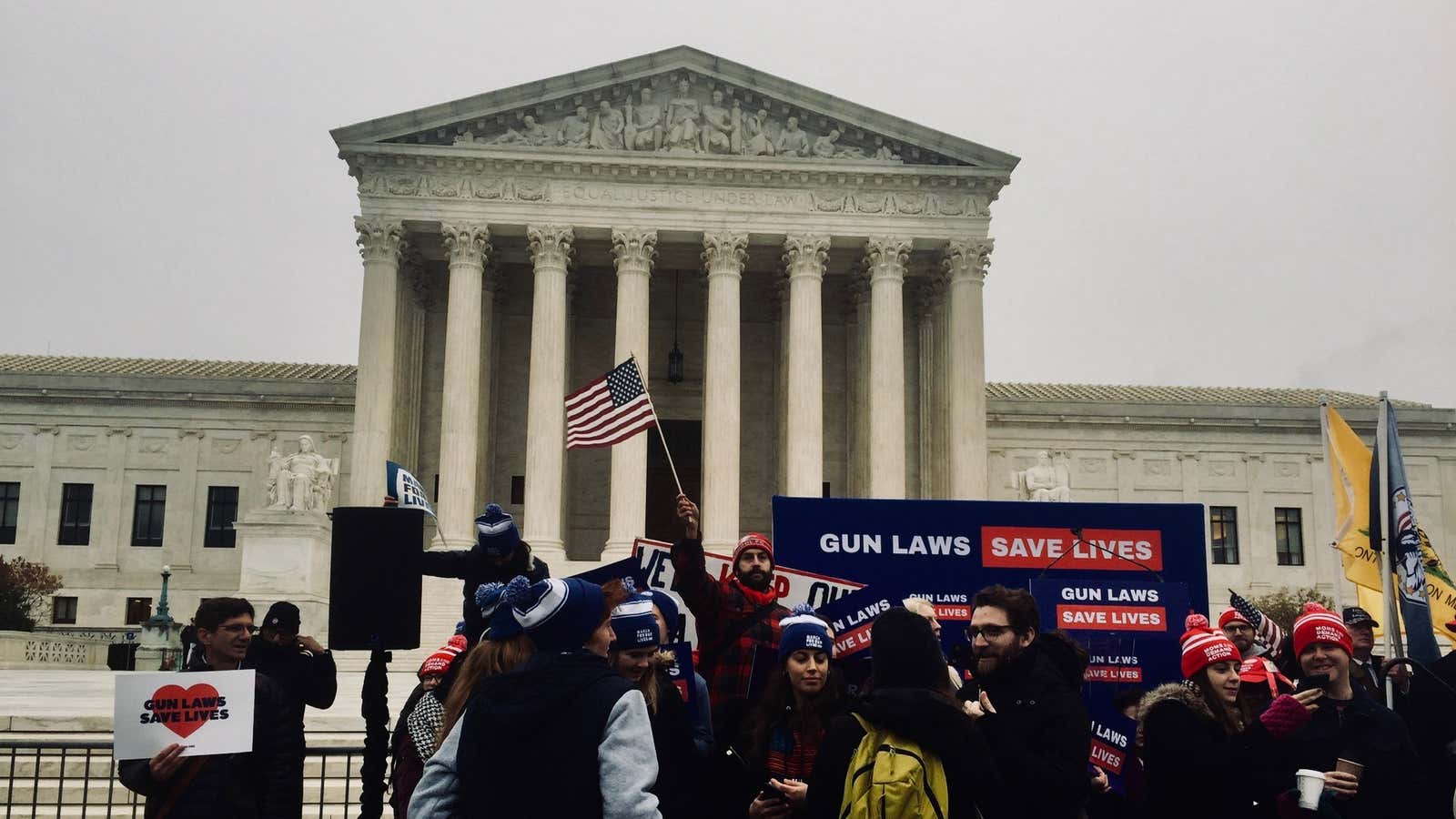The US Supreme Court heard oral arguments today in a gun rights case that, if the justices decide to review it, could have major consequences for how the Second Amendment is interpreted. But based on what was discussed at the hearing—and, at least as importantly, what was not—the highly anticipated case may not end with a bang.
The case arises from a New York City gun licensing scheme that limited transportation of firearms registered to a particular location. Members of the New York State Rifle and Pistol Association sued the city, arguing a violation of the Second Amendment right to bear arms. They needed to transport their guns—locked and unloaded—to firing ranges, shooting competitions, and second homes, and said the constitutional right wasn’t “homebound.”
Although the lower courts sided with the city, New York state later changed its law and the city adjusted its licensing scheme to allow for transportation in a move justice Neil Gorsuch today called “a herculean late-breaking effort” to avoid constitutional review by the Supreme Court.
Arguably the case is now moot, as the limits on transporting the guns that plaintiffs initially complained about no longer exist. What the justices must decide now, before they even think about the Second Amendment, is whether or not they can decide the case.
The court isn’t allowed to take cases that don’t represent live controversies, according to the Constitution. If there is no legal issue and no relief the court can offer the complaining party, then it’s not supposed to issue what would essentially be an advisory opinion.
Theoretically, that’s what a decision in this case would be, which is why in the end, there may be no decision at all, just a technical resolution on mootness. That would please many, including gun control activists who stood outside the courtroom in the cold and rain, waving signs saying, “Gun laws save lives.” Those who support expansive gun rights and would like to see a bench dominated by conservative justices take up the Second Amendment and issue a broad ruling that limits restrictions on firearm ownership, however, would be disappointed.
“You’re asking us to opine on a law that’s not on the books,” justice Sonia Sotomayor told Paul Clement, the attorney representing the gun group.
Ruth Bader Ginsburg asked him, “What’s left of this case? The petitioners got all they wanted.”
Clement countered that his clients did not yet get what they wanted and could still suffer consequences from the old law in the future. More importantly, he said, the new law did not give them what a decision in this case will—a declaration that the previous law was unconstitutional. The lawyer also argued that the new law leaves questions about the limits on transport: Can gun owners stop for coffee or gas when traveling with a firearm, for example, under the requirement their travel be “direct and uninterrupted”?
Sotomayor conceded that there may be questions remaining about the new law but indicated they were for another matter and not this case. Indeed, Clement couldn’t seem to move the discussion with the justices much beyond mootness.
The conservative justices, who gun rights activists might have hoped would decide the case in their favor, were unusually subdued during the hearing, speaking little (although perhaps that’s because their minds are made up). Chief justice John Roberts didn’t chime in during Clement’s arguments and spoke only late in the city’s presentation to ask if there was any way gun owners could in the future be prejudiced by the past law’s existence and to inquire about mootness. Justice Clarence Thomas kept his own counsel, as ever, and justice Brett Kavanaugh, who is inclined to ask questions normally, was mum. Gorsuch questioned both sides.
Only justice Samuel Alito clearly considered the controversy ripe for decision, insisting that it is “unfair” to the gun group to decide the case is moot. He pushed New York City’s counsel to discuss the Second Amendment and then injected a hypothetical situation for contemplation, asking whether a gun owner from the city could now stop at their mother’s house and help out with chores for an hour or whether this would violate the law.
New York City’s lawyer stuck firm to his position that any issues are for another case about the new law and any future violations. He continually assured the justices that there would be no consequences for gun owners as a result of the past city rules and that in the future any “reasonably necessary” stops would not constitute a violation of new laws.
“Is a cup of coffee reasonably necessary,” Gorsuch asked him.
Counsel said yes, stops for coffee, food, and gas were all fine and won’t be prosecuted as violations. But he admitted that he didn’t know yet, because the city hadn’t contemplated the scenario. “There may be a controversy here,” he concluded. “But it’s a new one.”
The justices have until late June to decide whether they think he’s right.
